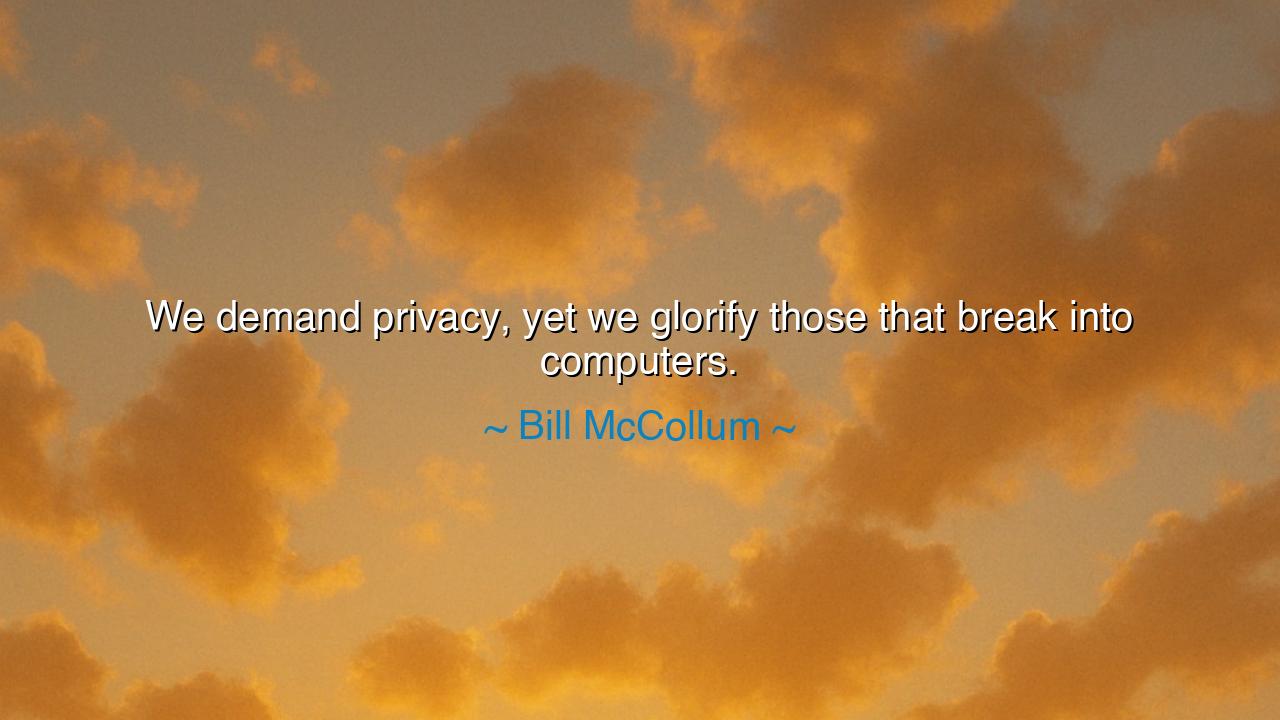
We demand privacy, yet we glorify those that break into






In the time of the ancient sages, when the first civilizations began to take shape, one truth was clear: privacy and trust were the foundations of human society. The early cities and villages were built not just on the physical structures of stone and timber, but on the invisible bonds of mutual respect and understanding. Trust between individuals allowed trade to flourish, families to grow, and leaders to guide their people. But as society evolved, so too did the complexities of trust—and with it, the delicate balance between the need for privacy and the temptation of intrusion. Bill McCollum, a man who has witnessed the shifting tides of modern life, offers this striking reflection: "We demand privacy, yet we glorify those that break into computers."
In these words, McCollum highlights a contradiction that lies deep within the heart of modern society—a contradiction that has been growing ever more apparent in our digital age. We, the inheritors of vast technological power, claim to value our privacy—that sacred space in which we can live freely, without fear of judgment or intrusion. And yet, we celebrate those who breach this privacy, those who violate the sanctity of digital spaces and expose the most intimate details of others' lives. Hackers—once feared as criminals—are now sometimes revered as rebels, as figures of admiration for their ability to penetrate the boundaries of digital security. This paradox, as old as civilization itself, speaks to the complexity of human nature and the ongoing struggle between freedom and order.
Consider the ancient Greek philosophers, who were some of the first to recognize the tension between individual autonomy and the greater good of the community. Socrates, who championed the search for truth, also emphasized the importance of respect for the laws and the sanctity of privacy in one’s pursuit of knowledge. Yet, even in his time, the freedom to think and speak without fear was often in conflict with the power of the state. Privacy, even in those early days, was not an inherent right but something that had to be protected from the forces of intrusion—be it from the government, the people, or other forces that sought to control it. The philosophers understood that without the ability to think freely, without the protection of one’s innermost thoughts and ideas, the human spirit would be forever shackled.
Similarly, in the rise of the Roman Empire, the freedom of speech and the security of personal life were often at odds with the power of the state. The emperors, with their immense control over the empire, frequently demanded access to the personal lives of their citizens. Privacy, in that age, was often an illusion, especially for those under the scrutiny of imperial power. Yet, even in that time, there were those who fought for the rights of individuals to live without constant surveillance, without fear of the government’s prying eyes. The glorification of hackers, as McCollum points out, echoes a similar historical tension: the freedom to explore and know, even at the expense of privacy, often leads to dangerous compromises.
In our age, the computer has become a new battleground for this age-old conflict. The Internet, with its vast networks of information, offers the possibility of freedom and knowledge unlike any other time in history. Yet, this freedom is paired with the potential for violations—where our personal data can be exposed, our lives intruded upon, and our most intimate secrets laid bare for all to see. Just as the ancient empires used force to demand compliance, the digital age uses technology as its tool of control. The glorification of those who break into computers—whether they are called hackers, whistleblowers, or rebels—reflects the deep irony at the heart of this conflict: we seek privacy but celebrate those who tear down the walls that protect it.
The lesson from McCollum’s words is a warning about the fragility of our values. In our pursuit of freedom and knowledge, we must be careful not to sacrifice the very things we hold dear. Privacy is not a luxury or a mere convenience; it is a fundamental right that allows the human spirit to flourish, to think, and to create without fear. To glorify those who break this sacred trust is to undermine the very foundation of the digital world we have worked so hard to build. It is a dangerous path that leads us down the road of anonymity, where the invasion of privacy becomes normalized, and the boundaries between what is right and wrong become blurred.
The practical actions we must take are clear. We must not allow the glorification of intrusions into the sanctity of privacy to go unchecked. Respect for the digital world, just as for the physical world, demands that we protect what is most personal and intimate. Whether in our personal lives or in our public dealings, we must fight to ensure that privacy remains a cornerstone of the digital age. In doing so, we uphold not just the right to privacy, but the very essence of what it means to be free. Let us honor the lessons of the past, and hold respect for the privacy of each individual, so that the digital age may be one of not just innovation, but of true freedom and integrity.






AAdministratorAdministrator
Welcome, honored guests. Please leave a comment, we will respond soon